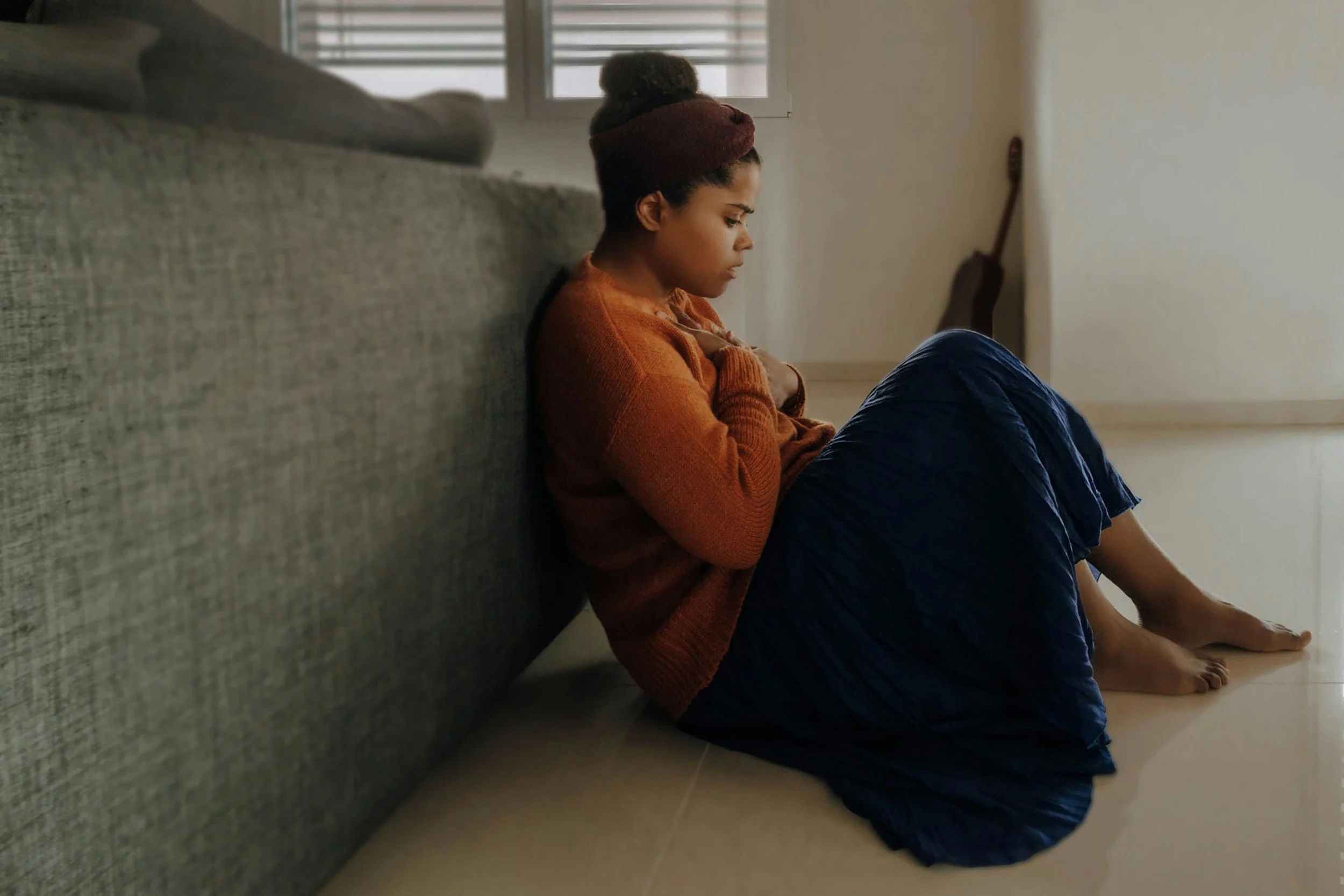
find calm and clarity.
Virtual anxiety therapy in NYC & NJ.
VIRTUAL THERAPY IN NEW YORK + NEW JERSEY | VIRTUAL THERAPY IN NYC + NEW JERSEY | VIRTUAL THERAPY IN NEW YORK + NEW JERSEY | VIRTUAL THERAPY IN NYC + NEW JERSEY
SOUND LIKE YOU?
On the outside, you might seem calm and collected, but inside your mind won’t stop spinning.
You’re in a constant state of tension, weighed down by racing thoughts, tightness in your chest, or the fear that you’re not doing enough — or that you are not enough. If everyday life feels exhausting and you can’t just “snap out of it,” anxiety therapy can help.
Find Lasting Relief From Anxiety Through Therapy in New York or New Jersey.
you’re not alone in your struggle.
Anxiety doesn’t always look like panic attacks. Sometimes it looks like overthinking every detail, avoiding situations because of “what-ifs,” or struggling to fall asleep with your heart racing.
While anxiety is a normal human response, untreated anxiety can begin to take over your relationships, your ability to focus, your physical health, and your sense of self. And the hardest part? It often comes with shame, like you should be able to handle it on your own.
Often, attempts to manage anxiety, through avoidance, numbing, or unhealthy coping, only make it worse over time. These short-term fixes rarely offer lasting relief. If you’re searching for effective, long-term support, therapy can provide tools and insight to help you feel more grounded.
You don’t have to carry anxiety alone. Together, we can find a steadier path forward.
Those things that used to help you feel better? They’re not working like they used to.
This space is for young adults in New York and New Jersey who are:
Feeling overwhelmed, on edge, or constantly worried
Struggling with overthinking, rumination, or perfectionism
Experiencing physical symptoms like tightness, nausea, or racing heart
Avoiding things due to fear, embarrassment, or “what-ifs”
Trying to manage stress without alcohol, food, or numbing
Wanting to feel more in control and less reactive
You don’t have to wait until things get worse to seek support. If anxiety is interfering with the life you want to live, therapy can help.
My therapeutic approach is…
VIRTUAL THERAPY FOR ALCOHOL RECOVERY
-
I take a client-centered approach that meets you exactly where you are. I believe the therapeutic relationship is the foundation for real, lasting change. I show up authentically so we can build a genuine, trusting connection where you feel seen, supported, and never judged.
My priority is to create a space where you feel safe and comfortable enough to open up, explore what’s really going on, and get exactly what you need from the therapy process.
-
What is Dialectical Behavior Therapy (DBT)?
DBT is a type of therapy that helps people manage strong emotions, especially when they feel like their feelings are too big to handle. It teaches ways to calm down when you're upset, think before acting, and build better relationships with others. It also focuses on balancing opposites—like accepting who you are but still trying to improve.
You’ll learn how to ride the wave of anxiety without drowning in it.
-
What is Cognitive Behavioral Therapy (CBT)?
This therapy helps people change the way they think and act. It’s based on the idea that how we think affects how we feel and behave. If we can change negative thoughts, we can feel better and make better choices. CBT is really helpful for anxiety, stress, or when people feel stuck in negative patterns.
With CBT, we work to untangle the thought patterns that keep your anxiety in motion like catastrophizing, black-and-white thinking, or self-blame.
-
What is Psychodynamic Therapy?
This type of therapy helps people understand how their past experiences affect how they feel and act today. It focuses on exploring things that might be in the unconscious mind—stuff we don’t always notice but that can shape our behavior. By becoming aware of these feelings or thoughts, people can make sense of their actions and start to feel more in control.
We explore how your past experiences and relational history may be fueling your present-day fears.
We move at your pace. Some days are for building skills. Other days are for just breathing, feeling, and being seen.
Challenges we’ll tackle…
Social anxiety
Panic attacks
Perfectionism and fear of failure
Performance anxiety
Rumination and obsessive thoughts
Body-focused anxiety (nausea, dizziness, tension, etc.)
Coping through alcohol, food, or numbing
Difficulty sleeping or relaxing
Fear of judgment or not being “good enough”
Whether anxiety feels constant or situational, therapy can address both the symptoms and the root causes.
Growth you’ll gain…
Feel less overwhelmed and reactive
Quiet racing thoughts and inner criticism
Understand where anxiety comes from and how to respond to it
Develop practical tools for managing stress and worry
Navigate social or work situations with more ease
Sleep better and feel more physically regulated
Calm your nervous system and feel safer in your body
Over time, many clients notice less intensity in their symptoms, stronger coping tools, more self-compassion, and a greater sense of confidence and calm. Anxiety no longer feels as overwhelming, and they feel better equipped to manage stress with resilience and flexibility. Clients often describe a deeper trust in themselves, more ease in relationships and work, and a steadier sense of clarity and control in daily life.
Hi, I’m Kendall.
I’ve experienced anxiety for as long as I can remember, so I know how overwhelming it can feel. From racing thoughts that won’t let up, the physical tension that sits in your chest, to the fear of losing connection or doing something “wrong.”
Therapy was life-changing for me — not because it made my anxiety disappear, but because it helped me understand it, accept it, and learn how to work with it. I believe that’s where real healing begins.
If you’re an adult in New York or New Jersey seeking an anxiety therapist, I’d love to work with you. We’ll start by making sense of your anxiety, looking at where it comes from and what it’s trying to protect you from. Building insight and awareness matters, but that is often only the first step. From there, we’ll build practical skills to help you move through anxious moments with more clarity, steadiness, and self-compassion.
-
Sessions are 45 minutes long and held virtually. We start with a check-in: what’s been coming up, what felt hard or good, and what you’d like to focus on.
From there, we may explore recent triggers, build emotion regulation tools, or work through anxious thoughts in real time. Some sessions might feel skills-focused. Other sessions might center reflection, grief, or self-understanding. All of them are shaped by what you need most that day.
-
In the early sessions, we’ll map out how anxiety shows up for you physically, emotionally, and mentally. We’ll identify what contributes to it, what helps, and what patterns you’re ready to shift.
-
As therapy progresses, you’ll gain tools for regulating your body and mind, understanding your internal world, and learning how to respond to anxiety with more choice and compassion.
-
We’ll revisit goals, track your progress, and name the wins, big and small. And when it’s hard, we’ll name that too. Because healing includes the messy middle.
A few more things to know about working together
01
Adapting to Your Needs
All sessions are offered virtually for clients in New York and New Jersey. Whether you’re managing a packed schedule or just prefer the comfort of home, therapy is designed to fit into your life—not add more stress to it.
02
A Collaborative Process
Therapy is a partnership. You don’t have to perform your progress or have all the answers. You just have to show up.
We’ll work together to make this space feel supportive, adaptive, and aligned with your goals, whether that means slowing down, going deep, or simply making it through the week.
03
Special Considerations
Please note: I do not provide medication management or crisis stabilization services. If you are in immediate distress or in need of psychiatric care, I can help connect you to additional support.

Let’s get started.
Because you deserve to breathe easier — inside and out.
In Need of Tangible Resources to Support Anxiety Outside of Therapy?
Check out our most recent blogs and downloadable resources:
-
This SMART Goal worksheet helps you break anxiety-related goals into clear, manageable steps so change feels structured and achievable. It also guides you in identifying potential barriers and the support you’ll need along the way.
-
This Habit Tracker helps you build consistent, grounding routines—like sleep, movement, breathing practices, or mindful breaks—that support nervous system regulation and anxiety relief.
-
This Mood Tracker allows you to observe daily emotional shifts, identify triggers, and spot patterns that influence your anxiety, helping you respond more effectively over time.
-
When you live with anxiety, your thoughts can feel constant and consuming. The Self-Discovery Journal helps you slow down and tune into what’s really happening beneath the surface. Through reflection on your emotions, relationships, values, and goals, you’ll begin to recognize patterns in your anxiety and understand where it comes from. This awareness is the foundation for change—helping you respond to anxious moments with greater clarity, balance, and self-understanding.












